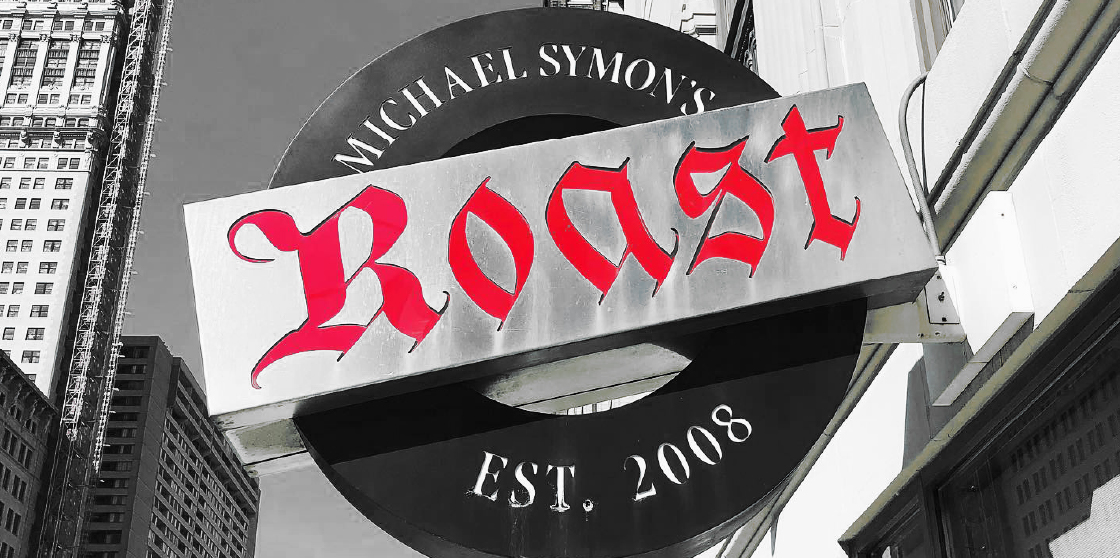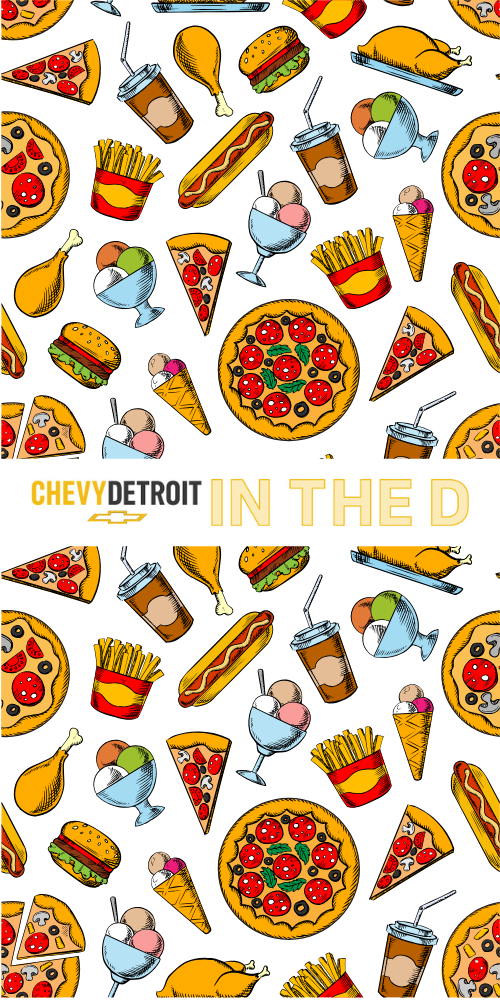Unleash the power of adventure with the Chevy Silverado's impressive towing capacity.

Before there was Selden. Or Chartreuse. Or Grey Ghost. Or any place that includes the words “New American” in its Instagram bio, there was Roast.
Before there was Sugar House. Or Kiesling. Or Two James. Or any bar that boasted an expertly-curated selection of “Craft Cocktails,” there was Roast.
This past weekend, the 14-year-old institution located within Detroit’s Westin Book Cadillac Hotel closed its doors for good. No doubt, it’s the end of an era. You’ll no longer find a $3 fried egg burger at their legendary happy hour. Nor will you call for Detroit’s now “modern classic” cocktail, The Skeleton Key, at its bar of origin.
But ask any chef in town who’s made waves over the past decade and they’ll be the first to tell you – Roast shaped this city’s contemporary culinary identity. And its impact can be felt – will continue to be felt – in every kitchen, behind every bar in Detroit.
Introducing… The Beverage Program
In 2007, Travis Fourmont packed his bags in Portland and journeyed east to the Motor City. Already a seasoned bartender, he applied for several jobs around town, including a new restaurant soon to open its doors. The interview was held right down the street, at the still-under-construction State Deli. When Fourmont met restaurant manager Frank Ritz, the chemistry was palpable. They bonded over a shared passion for life behind the bar and a mutual affinity for oysters (Fourmont, a Seattle native, was well-versed). “Do you know who Michael Symon is?” Ritz asked.
He did not.
“Go home and do some research. I’ll call you in a few weeks with the job.”
Michael Symon – or more appropriately – Iron Chef Michael Symon had already achieved celebrity status thanks to his Food Network victory. The Cleveland native intended to bring his unique vision for food and drink a few hours north.
When Roast opened in October 2008, the phrase “Craft Cocktail” was yet to find a place in the city’s common vernacular. Martini bars were in. Maybe you’d find a Manhattan if you knew where to look. But things were different on the West Coast.
“In Portland, mixology was just part of the job,” Fourmont explained. Deeper inland, you’d be hard-pressed to find a titled libation listed on a menu. All that changed when Fourmont and Ritz decided to give the beverage program a written nod.
“Just having those classic cocktails on paper… where people can see it and order it. That started everything.”
Younger readers may not even recall an era when cocktails were not present on restaurant menus. The phenomenon is less than twenty years old. And in this city, it started at Roast.
It wasn’t just a matter of providing paper real estate to phrases like Ramos Gin Fizz or Mezcal Negroni. It was about making a connection to something deeper, an ideal toward which Detroiters gravitate on a cellular level.
“It was all about educating the staff,” explained Fourmont. “Once the staff was educated, we had those stories to tell to the guests. Every one of those classic cocktails has a story. Be it from New Orleans or San Francisco or New York City. They all have a documented history to them. It’s a conversation piece.”
And once the conversation started, it couldn’t be stopped. It was a conversation amongst friends and family. Business associates. Perhaps most notably, amongst other players in Detroit’s restaurant scene.
People like David Landrum, whom Fourmont recalls surprising with a well-balanced mezcal negroni in the restaurant’s early days. He would eventually go on to open Two James Distillery.
Or David Kwaitkowski, who owns Sugar House right down the street.
Or Sandy Levine, an early Roast patron, now at the helm of The Oakland, Chartreuse, and new kids on the block, Freya and Dragonfly. “When I was working on opening The Oakland, Roast was the only bar I could go to where they even knew what the term ‘Classic Cocktail’ really meant, let alone how to execute them,” Levine reminisced. “I still remember ordering a Ramos Gin Fizz off their menu and Travis shaking the shit out of it and serving it perfectly.”
It was in this spirit of dedication to the craft that Roast forged its unique appeal in Detroit’s bar space, and in doing so, established Fourmont as an elite ambassador in the world of mixology, earning him an appearance in GQ’s Top Ten Bartenders in the United States, and Esquire’s Master of the Manhattan Championship.
Of course, booze is only half the story. Roast was never just a bar. It was the instigator of a culinary movement that within years of opening, would take the city of Detroit by storm.
New American
Often overlooked in comparison to the coasts, Detroit stands at the forefront of American innovation. From the progress of industry to the artistic movements that shape our nation’s collective identity, Detroit has always pushed beyond the confines of the norm.
But renaissance requires a catalyst. And when it comes to Detroit’s recent culinary explosion, that catalyst came in the form of a restaurant willing to do things differently.
New American – a sort of vague, overarching categorization of cuisine unspecific to a particular region or culture – lives on the cutting edge of Metro Detroit’s dining cornucopia. Heavy-hitters like Selden Standard, Grey Ghost and Mabel Gray all define themselves as purveyors of this fare. It’s fitting that in a city defined by multiculturalism and forward-thinking, a culinary genre of similar ideation would take hold.
Sandy Levine resides at the apex of the style’s most current iteration. A table at any one of his restaurants requires advanced booking, and more often than not – necessitates social media representation of the artfully refined dishes and cocktails that grace it. Sandy Levine, more than most, can appreciate Roasts’ influence on the present state of Detroit dining.
“I’d always considered Roast to be the first in the broad ‘New American’-style restaurant in Detroit where it could drop it in any other market and it would do well,” he explained. There certainly were other places that existed in ‘08 that fit that description, but they were mostly serving other cultures’ food or were maybe quirky, quick-casual places. Roast was modern and innovative in a way we hadn’t seen for a very long time.”
As the name implies, the menu was meat-centric. But unlike traditional steakhouses of past and present, Roast prioritized inclusion – both in terms of the dishes it served, and the patrons who enjoyed them.
“Obviously, the blue-collar aspect of Detroit lends itself to meat and potatoes, but they had a knack for making foods traditionally loathed by most people taste amazing,” Levine reveled. “Chicken livers with polenta and mushrooms. Fried brussels sprouts. We take for granted that when Roast opened nobody was doing brussels sprouts. Certainly not well. They’re everywhere now. Roast was the first to make really good ones.”
Perhaps it was this propensity for the eclectic that resulted in the diversity of the restaurant’s patronage.
“I loved the Roast clientele,” Levine beamed. “Especially at the bar for their legendary happy hour. It was truly diverse in the sense that you could have Black and white, young and old, students in flip flops and elderly folks coming from the symphony. This was a New Detroit restaurant that maintained Old Detroit charm and character – something we strive for in our restaurants. They did a wonderful job of presenting an extremely high-quality product while keeping it accessible to a vast array of people and personalities. As an owner, there’s a wonderful feeling of satisfaction when you look around your dining room and see all different types of people coming together to enjoy a shared dining experience.”
People Make the Place
How does one gauge the success of a restaurant? Is it the iconism of a specific dish? The memorability of exceptional hospitality? The loyalty of its patrons? Roast had all those things. But perhaps most notably – certainly most impactfully – is the legacy of elite professionals left in its wake. Just as university football teams, while successful in their own pursuit of victory, are most lauded for their NFL draft stock, restaurants, too, function as a real-world training ground for the next generation of chefs, bartenders, and ultimately, restaurateurs who go on to shape the industry.
To list all those who spent time under Roast’s employ is to play a who’s-who of Detroit’s most influential culinary minds. Travis Fourmont, along with Joseph Allerton, plans to open Bar Pigalle in Brush Park this coming spring. Andy Hollyday, who helmed the kitchen for much of the restaurant’s tenure, now owns and operates the city’s most sought-after Resy booking – Selden Standard. If you’re seeking direct lineage, look no further than their iconic lamb ragu.
Drew Pompa (Takoi, Magnet). Rick Lane (formerly of Buhl Bar). Brian Vulmer – creator of The Skeleton Key cocktail (The Royce), John Yelinek (The Shelby). The list goes on and on.
So, yeah, Roast will be sorely missed. Countless Detroiters will have to seek their post-work elixir elsewhere. Maybe for a little while, happy hour won’t be quite so happy.
But when you arrive at your dinner reservation this weekend, and you open the menu, and you’re greeted with one and a half dozen craft cocktail selections to pair with your pan-fried brussels sprouts, you’ll know whom to thank.




